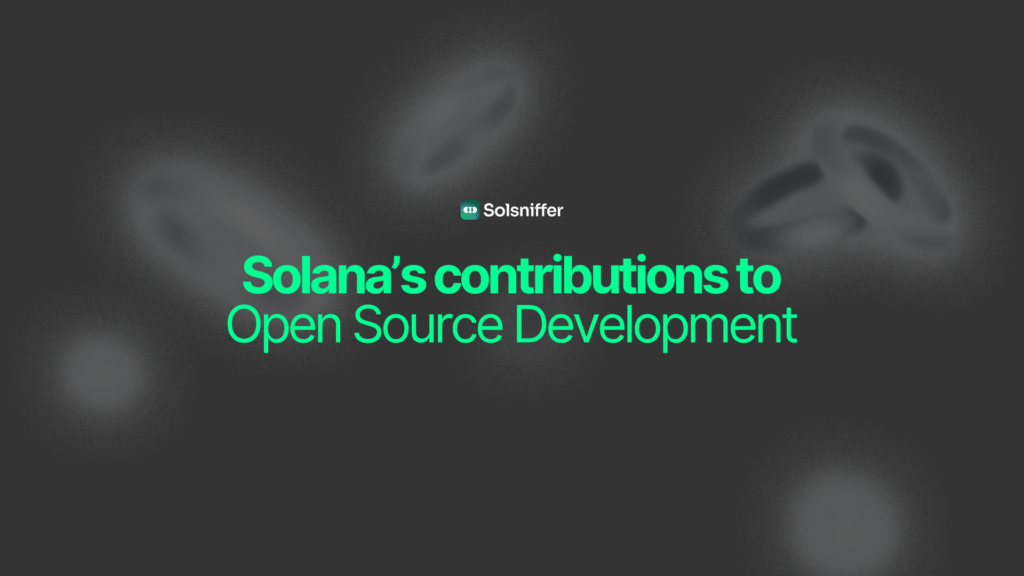Solana, an open-source blockchain platform, is currently a leading contender in the blockchain space due to its high scalability, transaction speed, and low costs. The platform is also recognized for innovative projects sanitizing the crypto space, such as Solsniffer, a token scanner designed to detect crypto scams and protect users from potential fraud, such as rugpulls and scams in crypto. Developed in 2017 by Anatoly Yakovenko and Raj Gokal, Solana was designed to address the inefficiencies of Ethereum, offering an alternative that excels in various critical areas. Solana has since made significant contributions to open-source development and possesses several unique advantages that make it a preferred choice for developers and businesses alike. We review some of these contributions below.
High Scalability and Security
One of the standout features of Solana is its unique Proof-of-History (PoH) consensus mechanism. Unlike traditional blockchain consensus methods, PoH enables Solana to timestamp transactions before they are added to the blockchain, allowing for higher throughput and lower latency. This method not only speeds up transaction processing but also enhances blockchain data security by preventing potential intrusions and ensuring the integrity of the blockchain.
Energy Efficiency and Cost-Effectiveness
Solana’s blockchain is built to be energy efficient, addressing one of the significant concerns in the crypto industry. The platform’s innovative design allows it to process transactions at a fraction of the cost compared to other blockchains. With an average transaction fee of $0.00025, Solana offers a cost-effective solution for businesses, ensuring financial stability while maintaining high performance.
Versatile Programming and Development Tools
Solana’s commitment to open-source development is evident in its support for multiple programming languages. The core of Solana blockchain development is the Rust programming language, known for its performance-critical capabilities without the need for a garbage collector or runtime. Rust’s integration with other programming languages facilitates smooth engineering and development on the Solana blockchain.
Additionally, Solana supports smart money trading with creative dApps and smart contract development using languages such as C++ and Rust, broadening the scope for developers. This versatility is further enhanced by third-party APIs, making it easier for developers to build and deploy decentralized applications (dApps) on the Solana platform. The platform also supports crypto trading signals and automated cryptocurrency trading through various tools and integrations.
Comprehensive Development Ecosystem
Solana Smart Contract Development
Solana provides a robust environment for smart contract development, supporting various programming languages and tools. This flexibility allows developers to create secure and efficient smart contracts tailored to their specific needs. The platform’s PoH consensus ensures that these contracts operate smoothly, with historical records of transactions enhancing transparency and traceability.
Solana DApp Development
The Solana blockchain is ideal for developing powerful dApps across various industries. Its high throughput and low latency make it suitable for applications requiring rapid transaction processing. Some of the popular dApps built on Solana include Jupiter, Phantom, Solflare, Magic Eden, Pump.fun, MarginFi and Soland. These applications benefit from Solana’s robust infrastructure and secure transactional environment, ensuring they remain operational and reliable.
Solana DeFi Development
Solana has fostered a thriving ecosystem for decentralized finance (DeFi) development. Businesses can build DeFi protocols that support trading, lending, and investment of crypto assets with high efficiency. The platform’s ability to handle high throughput at low costs makes it ideal for DeFi applications. Notable DeFi projects on Solana include Orca, Drift Protocol, Jupiter Aggregator, and Raydium, among others. The platform’s ability to integrate with a cryptocurrency exchange enhances its appeal to traders looking for the best crypto coin to buy.
Open Source Contributor Funding
Recognizing the challenges in traditional idea-based funding processes, Solana is experimenting with an open-source contributor funding approach. This initiative aims to make it easier for developers to participate in the ecosystem without the burdensome requirements of proposal submissions and budgeting complexities. By directly funding developers interested in contributing to open-source projects, Solana hopes to attract impactful talent and foster a more collaborative development environment.
Prominent Open Source Projects
Solana’s commitment to open-source development is reflected in its diverse array of projects available on platforms like GitHub. These projects range from developer tools and infrastructure components to DeFi applications and educational content. Some noteworthy repositories include Anchor, Solana Project Template, Solana Wallet Adapter, and many more. These projects serve as valuable resources for developers looking to learn from and contribute to the Solana ecosystem. Tools like a crypto data APIs, wallet portfolio tracker and token sniffers enhance developers’ ability to manage and analyze their cryptocurrency activities.
Solana’s contributions to open-source development are profound, offering a highly scalable, secure, and cost-effective blockchain platform. Its innovative PoH consensus mechanism, versatile programming support, and comprehensive development tools make it a preferred choice for developers and businesses. By fostering a collaborative and inclusive development environment, Solana continues to push the boundaries of what’s possible in the blockchain space, solidifying its position as a leader in open-source blockchain development.
Solsniffer, Secure Trading and Security on Solana
Solana token scanner: https://solsniffer.com/sniftokens/
Solana wallet portfolio tracker: https://solsniffer.com/snifwallets/
X (Twitter): https://x.com/solanasniffer
Telegram: https://t.me/solana_sniffer

